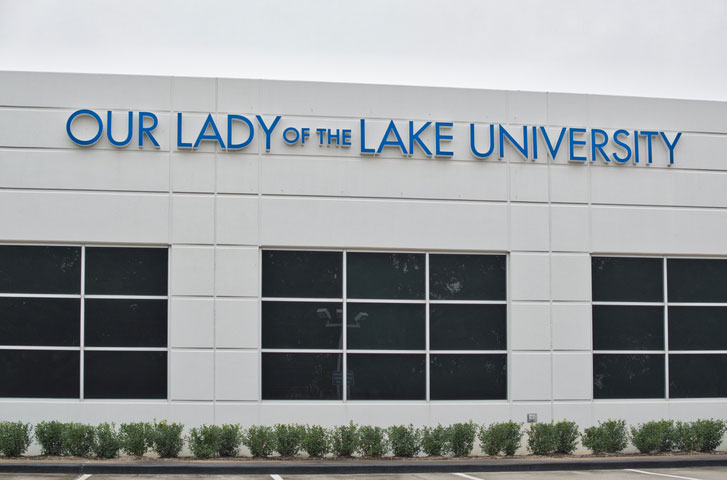Created by TexasSocialWorkEDU.org Contributing Writer

For many students, deciding to go to graduate school is something of a leap of faith. It can be hard to get a strong sense of what your day to day life will look like during an MSW program, especially if you don’t have any personal contacts who have attended the programs you’re interested in.
Speaking directly to students can offer a sense of the on-the-ground experience of attending an MSW, which is why we’ve sought out current MSW students in Texas to help prospective applicants get the lay of the land.
If you’re thinking of pursuing a Master of Social Work in Texas, let us introduce you to Alicia Miller, who completed her BSW at Our Lady of the Lake University in San Antonio, TX, and is now completing the Advanced Accelerated MSW program at the same school. Her experience can provide useful insight about attending school for social work and a clearer picture of how you can fit it into the rest of your life.


About Alicia
Alicia Miller is a mother of two currently based in Tampa, Florida. She completed the Online Bachelor of Social Work program at OLLU while she was a resident of San Antonio, where she was originally studying to be a teacher. “I got inspired to go into the social work program when I was actually taking classes to be an elementary school teacher,” she explains. “I found that I had a desire to help and was drawn more to the social work aspect than I was to teaching.”
This led her to an academic pivot, leading her to major in Social Work and graduate with a BSW. From there, her plans changed again. “I thought I was just gonna get my BSW,” she says, “and then as I took classes, I realized ‘Oh my goodness, I want to get my masters because I can do this with my masters.’”
She discovered her BSW made her eligible to pursue an accelerated MSW degree. These programs are only an option for BSW holders, who are expected to have already covered the foundational courses on the history and procedural frameworks of the social work profession in their undergraduate studies. This made it easy for Alicia to jump headfirst into the next step of her educational journey, even as she moved to Tampa, Florida with her family. Because she had such a positive experience at OLLU, she opted to continue studying for her social work degree at the school, again making use of their online course offerings.
Having made the transition from pursuing teaching to becoming a social worker, does she have any regrets? Hardly. “My passion for loving what I do has truly made me more effective at my practice,” she says. “It really makes a difference if you love what you are doing instead of just doing it to collect a paycheck.”
Finding a Focus Area
Deciding to focus on social work wasn’t Alicia’s only educational pivot. Having originally been interested in working in a school environment, Alicia had first gravitated toward school social work. “I was set on wanting to be a school social worker because I liked the idea of having two young kids that are in school. And so I kind of wanted to have that school schedule,” she explains.
However, one game-changing course sent her in a new direction. “It all changed when I started my human trafficking course. I was drawn in. I loved reading all the material and learning about everything regarding human trafficking. I knew this was my calling and how I wanted to help.”
This led Alicia to pursue a field work internship related to human trafficking, giving her the opportunity to witness the day-to-day responsibilities of social workers in her chosen field. Though the school didn’t have a pre-existing connection to such an organization, Alicia established one herself. “When it came time to pick my field placement, I found an anti-human trafficking organization in my area and started the process to get a relationship built between them and OLLU so I could do my fill placement there.”
That’s not to say that it felt like it would be easy. At first, doing the extra legwork to find a human trafficking organization felt daunting, and Alicia wasn’t sure if her efforts would pay off. To her surprise, the Internet made her search far simpler than she expected. “I got on social media, started browsing different organizations and reaching out to people, and I found that it was easier than I thought. And by getting in contact with those people, I made contacts that have been helpful throughout my education and will be helpful in my career.”
Asked if that extra effort was worth it, Alicia gives a resounding yes. In fact, it helped her confirm that this career path is the one she really wants in the long term. “I got placed in [an] assessment home for survivors of sex trafficking and it was an incredible experience. I got to see first hand that you can truly find light even in the darkest circumstances, and the difference that one person can make. I was surrounded by hope and women who were really working towards making a better life for themselves, and it truly was life changing. I will never forget it.”

Finding the Balance Between School and Family Life
Alicia has always attended online programs so that she can still tend to the needs of her two young children. She admits that initially, figuring out how to balance these responsibilities was tricky. “It was an adjustment at first. I really became good at budgeting my time so I could make time for my family as well as making sure I was putting in my best effort for my classes.”
She gradually learned how to take advantage of the online school setup, figuring out how to fit it into her daily routines and her children’s schedules. “That’s the beauty of online classes at OLLU: I can do my coursework during the day or at night or whenever I just have the time. I have spent so many nights just sitting in my car at my daughter’s cheer gym doing homework.”
Does working this much interfere with her enjoyment of her classes? No, she insists, because the education she’s receiving fuels her passion. “I find that the classes are enjoyable because I truly love the subject matter,” she says. Indeed, by reminding herself that these social work classes are ones she’s completing to further her own dreams, Alicia can stay motivated to fulfill her coursework expectations while navigating her daily responsibilities as a mother.
Self-Care Strategies for a Healthy Work-Life Balance
Any Master of Social Work student will agree that balancing coursework, field work expectations, and outside responsibilities can be time-intensive and emotionally intense. However, learning how to manage the stress and complexity of being a social worker is a crucially important professional skill that will save future social workers from burnout, compassion fatigue, and other responses to the high pressures of the job.
For Alicia, maintaining equilibrium comes down to staying connected to those around her. “I find healthy balance by making sure that I am making time for myself and for my family and for my school. I make sure I am talking to people about how my day is going, whether it be I’m talking with a friend or a family member, or my husband, or even someone professional, for my self care.” Indeed, social workers can sometimes feel isolated working up close to overwhelming challenges that other people are facing, and it can be hard to integrate those experiences into home life. Leaning on loved ones and keeping them updated on your day to day experiences can help you stay encouraged on the job.
Alicia also advocates for cultivating outside hobbies and interests, especially those that offer some catharsis. “I attend a boxing class five to six days a week, which has been really good for both my mental and physical wellbeing,” she explains. Though it may seem like adding even more to a packed schedule, taking on pursuits like this provides much needed space for “me time,” an important part of staying mentally healthy that many selfless social workers don’t invest in enough.
More Advice from Alicia for Prospective MSW Students
Understanding how daunting attending social work school can be, Alicia has advice for prospective applicants: it’s worth it. “I would tell a prospective social work student to go for it,” she says. After all, there are still plenty of directions it can take you. “There are so many different opportunities and options in the social work field.”
She also recommends keeping an open mind while you’re in school. “You may change what you want to focus on regarding social work as you take these classes and that’s the fun part: truly discovering what you are passionate about.” Students who are already drawn to the social work profession should have no trouble discovering this passion, as the profession promises a meaningful experience. “Having a career that is based around helping others is truly rewarding,” Alicia explains.
Is there anything else Alicia would recommend? For those getting ready to graduate, she advises making the effort to attend the ceremony. “There is nothing like walking across the stage and knowing that all your hard work has paid off and you have done it.” This is an invaluable experience even for remote students like Alicia, who found it to be the perfect conclusion of her academic journey. “I flew into San Antonio from Tampa and I got to meet some of my professors that I really looked up to and some of my other fellow students. And it really was an amazing experience.”

Finally, Alicia has advice for those who are just starting their MSW programs: join the National Association of Social Workers (NASW) and find their local chapter. “They have so many great resources to help you as you move on in the field,” she explains. This means the earlier students sign up, the more the NASW can do for them.
Alicia’s Bright Future as a Social Worker
Alicia’s Advanced Standing MSW is a one-year full-time program that will leave her with a Master of Social Work degree. So what are her next steps after that? Initially Alicia had planned on obtaining her Licensed Master of Social Work (LMSW) certification, which she will be eligible for once she has her graduate degree. But Alicia wants to take it one step further than that. “As I’m looking on with it I’m like, ‘Now I want to get my Licensed Clinical Social Worker (LCSW) after that because then I can do so much more after that.’”
Becoming an LCSW will give Alicia the authority to perform direct counseling and therapeutic services for victims of human trafficking, a role with tremendous responsibilities that can provide invaluable support to the people who need it most. While it will take around two years of supervised field work to become eligible for this credential, it will pay off, leading Alicia to her dream job.
Beyond the career training all this schooling has given Alicia, it has also led to her immense personal growth, which has made it all the more meaningful of an experience.
“I went from this shy, quiet girl to someone who if I see something that I don't agree with or I don't understand or I speak up. So it's just been an amazing journey and I am so grateful for it.”





